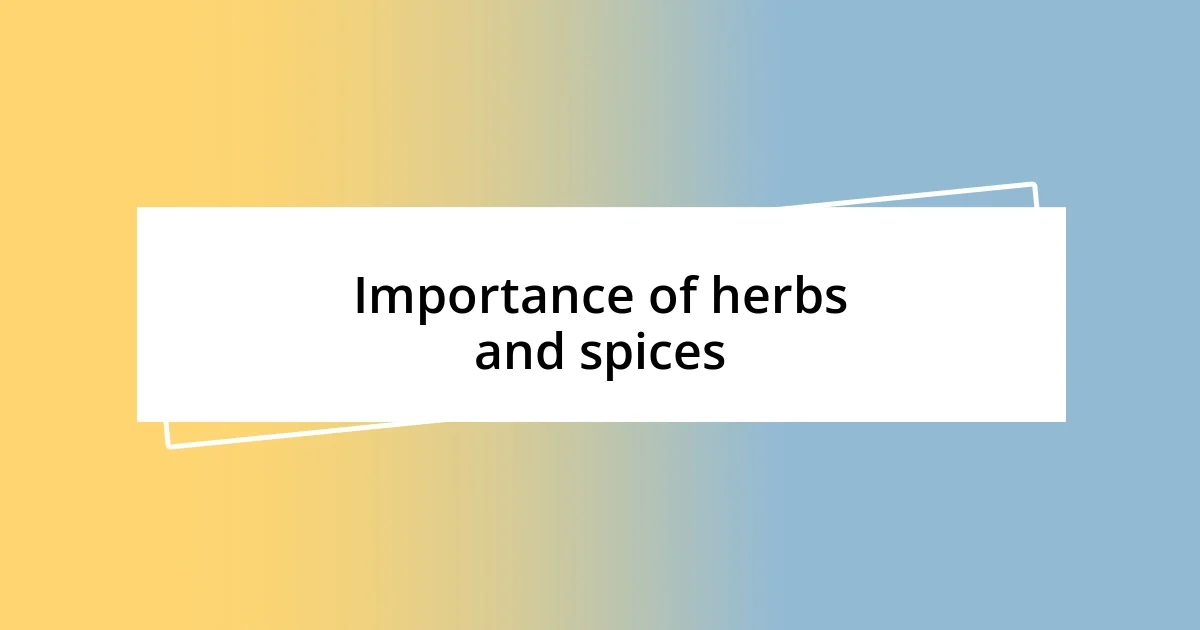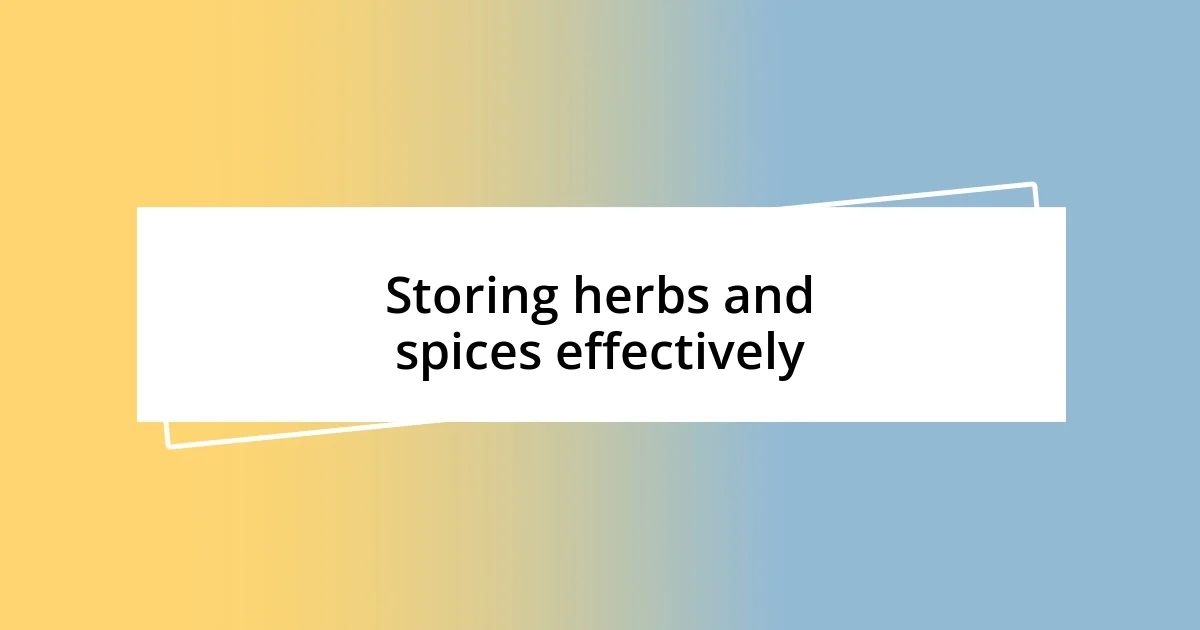Key takeaways:
- Herbs and spices enhance culinary experiences by adding flavor, aroma, and potential health benefits, fostering connections and traditions in cooking.
- Common herbs like turmeric, garlic, and cilantro offer significant health benefits, such as anti-inflammatory properties and immune support.
- Effective storage techniques, such as using dark containers and freezing fresh herbs, can significantly prolong the freshness and flavor of herbs and spices.

Introduction to herbs and spices
Herbs and spices have been vital to culinary traditions around the world for centuries. I remember the first time I tried fresh basil from my garden; the aroma was intense and transformative. It made me wonder how something so small can carry such powerful flavors and potential health benefits.
When I think about the versatility of herbs and spices, I find it fascinating how they can elevate a simple dish into something memorable. Have you ever noticed how a dash of cinnamon in your oatmeal can create warmth and comfort? For me, that little twist makes all the difference and evokes a sense of nostalgia, like a warm hug from my grandma.
Exploring the world of herbs and spices is like embarking on a flavorful adventure. Each time I discover a new combination, I can’t help but feel excited about the possibilities it brings to my cooking. Isn’t it exhilarating how a few simple herbs can transport a dish from mundane to extraordinary? It’s this potential for exploration and enjoyment that keeps my passion for cooking alive.

Importance of herbs and spices
Herbs and spices hold immense importance in both cooking and health. From my perspective, they are not just flavor enhancers; they can be a source of wellness. For example, I often turn to turmeric when I’m feeling under the weather. Its anti-inflammatory properties make it a comforting addition to soups and golden milk, and I genuinely feel its benefits.
In many cultures, herbs and spices are celebrated not only for their culinary uses but also for their healing abilities. Think about garlic—beyond being a staple in many kitchens, it has been revered for its potential to boost the immune system. I remember my grandmother swearing by her homemade garlic broth during flu season; it’s a memory that highlights their deep-rooted significance in our lives.
Moreover, herbs and spices create more than just taste; they foster connection and tradition. I cherish the moments spent cooking with friends, where a pinch of oregano or a sprinkle of cumin sparks stories and laughter. These shared experiences remind me that food is much more than sustenance—it’s a bridge between cultures and generations.
| Herb/Spice | Importance |
|---|---|
| Basil | Aroma and flavor enhancer |
| Turmeric | Anti-inflammatory properties |
| Garlic | Boosts immune system |

Health benefits of common herbs
Herbs are more than just a culinary addition; they often carry significant health benefits that I’ve experienced firsthand. For instance, I’ve always adored the vibrant taste of cilantro, but I was pleasantly surprised to learn that it can help detoxify heavy metals from the body. A few months ago, after hearing about its benefits, I added it generously to my smoothies, and it became my go-to green boost. Incorporating herbs into daily meals feels like inviting wellness into my kitchen.
Here are some common herbs and their health benefits:
- Peppermint: Known for aiding digestion and relieving headaches.
- Oregano: Packed with antioxidants and has antibacterial properties.
- Rosemary: May improve memory and concentration while also acting as an anti-inflammatory.
- Sage: Supports brain health and can enhance mood.
- Thyme: Offers antimicrobial benefits and can help ease respiratory issues.
Each of these herbs adds a unique flavor to dishes, but the added health benefits elevate their importance in my cooking even more. It’s gratifying to know that with each sprinkle and dash, I’m nurturing my body as I savor every bite.

Flavor enhancement with spices
When it comes to flavor enhancement, spices can truly transform a dish in ways that go beyond just taste. Take my experience with chili powder, for example. The first time I added it to a simple bean stew, I was astonished by how a mere teaspoon awakened the entire flavor profile. It was like turning on a light in a dimly lit room; suddenly, every ingredient shone brighter and more vibrant.
I often find myself experimenting with smoked paprika. The smoky depth it brings adds a certain warmth that feels like a cozy hug on a chilly evening. I still recall a gathering where I sprinkled a bit into a roasted vegetable medley, and the compliments flowed in. It’s moments like these that remind me how spices can create not just delicious food but also shared experiences and memories.
Have you ever wondered how a pinch of cinnamon can elevate a savory dish? I once added it to a Moroccan-inspired chicken tagine, and the warmth and sweetness from the spice balanced the savory elements beautifully. This simple addition opened my eyes to the idea that enhancing flavor is really about creating balance. It’s in these little discoveries that I find a deeper appreciation for spices, transforming my cooking into a delightful adventure every time I step into the kitchen.

Popular herbs for cooking
One of my all-time favorite herbs to cook with is basil. The first time I savored a fresh Caprese salad, I was completely taken aback by the herb’s sweet, peppery kick mingling with the creamy mozzarella and ripe tomatoes. I still remember that moment in my kitchen when I decided to toss some basil into a homemade pesto; the vibrant green color and intoxicating aroma just made the whole dish come alive. Have you ever experienced the transformation one herb can bring to a simple recipe?
Basil isn’t alone in the spotlight; I’ve also developed a true love for dill. When I tried my hand at making a homemade tzatziki sauce, the addition of fresh dill was a game changer. It added that unique tanginess that perfectly complemented the creamy yogurt and refreshing cucumber. The beauty of cooking with herbs like dill is that they evoke such a sense of nostalgia. It reminds me of summers long past, gathering with friends around a picnic table, savoring homemade dips and laughter.
Then there’s thyme, which I find incredibly versatile. I still remember the first time it made my roasted chicken dish sing. Just a few sprigs elevated the flavors to something sublime. Have you noticed how some herbs can truly become a staple in your kitchen? Thyme has become one for me, effortlessly blending into multiple recipes, from soups to marinades. That’s the magic of cooking with herbs—they can add depth and layers of flavor, turning an ordinary dish into a culinary celebration.

Tips for using dried herbs
When using dried herbs, timing can be everything. I remember the first time I added oregano to a pot of simmering tomato sauce. It was a simple dish, but I learned that tossing the dried herb in early allowed it to infuse its flavor deeply into the sauce, creating a rich, aromatic base. Have you ever felt that difference when you wait versus when you add herbs at the end? The flavor really blossoms if you give it time.
Another tip I swear by is crushing dried herbs before adding them to dishes. I can vividly recall the first time I crushed dried thyme with my fingers before sprinkling it over roasted potatoes. The aromatic oils released as I crushed them transformed not just the smell of my kitchen but also the taste of the finished dish. It’s fascinating how a little extra effort can yield such rewarding results, isn’t it?
Lastly, remember that dried herbs are more concentrated than fresh. I once seasoned a soup with a full tablespoon of dried basil, only to find the flavor overpowering. Now, I start with a smaller amount, like a teaspoon, and adjust to taste. It’s a lesson in patience and restraint, but I find that it’s a small step that leads to a well-balanced dish, allowing all the ingredients to shine. What strategies do you use to incorporate herbs into your cooking? Sometimes, simple adjustments can transform your meals in delightful ways.

Storing herbs and spices effectively
When it comes to storing herbs and spices effectively, keeping them fresh is key. I’ve learned that light, heat, and moisture are the enemies of flavor. A few years back, I made the mistake of leaving some beautiful paprika on my countertop. It lost its vibrant color and depth, leaving me disappointed in my next dish. Now, I stash my herbs and spices in dark, airtight containers—it’s a small change that has made all the difference.
I also find that labeling my jars serves two purposes: it adds an element of organization and reminds me of their shelf life. I still chuckle at the time I made a pasta sauce with what I thought was dried parsley, only to discover it was actually sage. The unexpected flavor was… interesting to say the least! By marking the date I opened each container, I can enjoy the freshest taste possible. Have you ever had a mix-up like that? A simple label can save you from culinary surprises!
Lastly, I swear by the freezer for storing fresh herbs. Whenever I have a bunch of cilantro or basil that I can’t use right away, I chop it up and freeze it in ice cube trays with a bit of olive oil. This not only preserves their gorgeous flavors but also ensures I have ready-to-use herbs for my cooking later. The first time I added one of those frozen cubes to a pot of curry, I was delighted by the burst of freshness it brought. It made me wonder—what other clever storage techniques have you discovered to extend the life of your herbs and spices?














